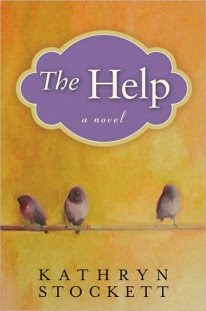Book Review: The Help
 "Do you ever wish you could...change things?"
"Do you ever wish you could...change things?" - Skeeter to Aibileen
My family never had domestic help because we were too poor. But I always imagined that though there might be some racial or class conflict, the black and white ladies who run a household elbow-to-elbow would somehow share a mutual respect for one another. According to Kathryn Stockett’s The Help, I was both right and wrong on this perception, but, boy, when I’m wrong, I’m wrong!
The Help is the story of three women: Skeeter, a white graduate from Ole Miss who still lives at home under the genteel and critical thumb of her DAR mother; Aibileen, a proud, educated black woman who has raised 17 white children but lost her only son to a work accident; and Minny, a short, fat firecracker of a woman who has a hard time finding domestic jobs because her reputation for sass precedes her. These women come together when Skeeter proposes that they co-author an anonymous book about what it’s like for a black woman to work as a maid and nanny in a white household.
Threatening their anonymous project are Hilly Holbrook and Elizabeth Leefort, friends in Skeeter’s social circle. Hilly is the president of the Junior League, and her political platform is how to stay protected against the diseases Negroes carry and pass along as they’re cooking, cleaning, and raising white children in wealthy white households. She’s too blinded with race and class prejudice to see the hypocrisy of building ramshackle toilets in backyards and garages for Negro domestics while raising money to send to the League's charity—The Poor Starving Children of Africa. Elizabeth is a sycophant who mimics everything Hilly does. Too busy trying to worm her way into high society, she leaves the raising of her neglected daughter Mae Mobley to Aibileen, who loves Baby Girl as her own and sneaks in lessons of self-worth and tolerance between her daily chores, hoping the lessons will stick long after she's gone.
Not all is black and white in Stockett's black and white world. Skeeter's gentle father has worked a farm all his life and has developed a respect for and dependence on his black hired hands; and Miss Celia, "white trash" newly planted in Jackson, Mississippi, learns the hard way that it's not only race that keeps good people down in her town. Though she doesn't know it at first, Celia is lucky she's so far out of Jackson's social loop that she hires the blackballed Minny as her maid. Against Minny's better judgement of getting involved in crazy white people's lives, she and Miss Celia become allies in one of the many battles in the Civil Rights war.
I’ve read some reader criticisms about Stockett’s use of the southern dialect in The Help. Some just can’t believe that anyone in America, even in the rural south of the ‘60s, would use phrases like “law have mercy” and “sho’nuff.” But I’d like to introduce these people to some relatives who say “aimbulaince” and “healiacopter.” Readers should remember that the story is set over 40 years ago—decades before our cultures became more homogenized and our world made smaller by television and the Internet. And besides, Stockett grew up in a southern household that still employed the maid that started working for the family when her father was 14 years old. She speaks from experience.
The Help is one of those books that has taken off on word of mouth, similar to the literary phenomenon of The Lovely Bones. If I may toss out some tired clichés, Skeeter, Aibileen, and Minny will make you laugh and, yes, cry. Laugh and cry a lot.
Reserve your copy today!
Links:
Take a sneak peek at The Help with Amazon's Look Inside feature
Search Encore for information on the Civil Rights Movement
Comments